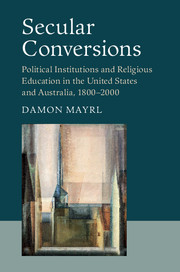 Secular Conversions
Secular Conversions Book contents
- Frontmatter
- Contents
- List of Figures and Tables
- Acknowledgments
- List of Acronyms
- Introduction
- 1 Politics, Institutions, and Secularization
- Part I Forging the nineteenth-century settlement
- Part II The nineteenth-century settlement in transition
- Part III Forging the twentieth-century settlement
- Part IV Implications
- Epilogue: Toward a Twenty-First-Century Settlement?
- Index
Part II - The nineteenth-century settlement in transition
Published online by Cambridge University Press: 05 August 2016
- Frontmatter
- Contents
- List of Figures and Tables
- Acknowledgments
- List of Acronyms
- Introduction
- 1 Politics, Institutions, and Secularization
- Part I Forging the nineteenth-century settlement
- Part II The nineteenth-century settlement in transition
- Part III Forging the twentieth-century settlement
- Part IV Implications
- Epilogue: Toward a Twenty-First-Century Settlement?
- Index
Summary
With state schooling established as the dominant partner in education by 1880, a durable secular settlement had been established in each country with strongly similar characteristics: religion was permitted in public schools, and financial support was barred from flowing to religious schools. Yet, in the United States, the nineteenth-century settlement began to erode almost immediately, particularly in the public schools, where the prevalence of religious devotionals began a slow but steady decline. In Australia, by contrast, the nineteenth-century settlement proved remarkably immune to political or professional challenge until its precipitous reformulation in the 1960s.
Part II of this book examines the divergent fates of the nineteenth-century settlements, and it focuses on how systems of educational administration affected the politics of religion – and hence the trajectory of secularization – between the late nineteenth century and the end of World War II. In so doing, it uncovers important distal trends that set the stage for the transformation of the 1960s. While the events of the 1960s were dramatic, they cannot be understood simply in terms of their immediate historical context. Political processes are often big and slow-moving, with effects that only unfold over extended historical periods. The rise of the twentieth-century settlement likewise depended upon dynamics generated by the unfolding of religious conflict and professionalization over the long term.
These chapters argue that variations in administrative institutions are central to explaining why public school devotionals declined in the United States, but not in Australia. In the United States, the decentralized system of local board control made American education permeable to challenges by Catholics, Jews, and other religious minorities dissatisfied with the pan-Protestant, “non-sectarian” devotionals so central to the nineteenth-century curriculum. These challenges eroded religion's position in the public schools from the bottom up. At the same time, the decentralized development of education also unleashed strong professionalizing dynamics among American educators, ultimately leading to the development and diffusion of new, professional pedagogical ideas that rapidly marginalized religion from the top down. In Australia, by contrast, centralized control over education insulated educational policy from minority challenges, and attenuated professional development among teachers. This contributed to conservatism and stasis in Australian education throughout the early twentieth century, both in general and more specifically in regards to religious policies.
- Type
- Chapter
- Information
- Secular ConversionsPolitical Institutions and Religious Education in the United States and Australia, 1800–2000, pp. 79 - 80Publisher: Cambridge University PressPrint publication year: 2016
